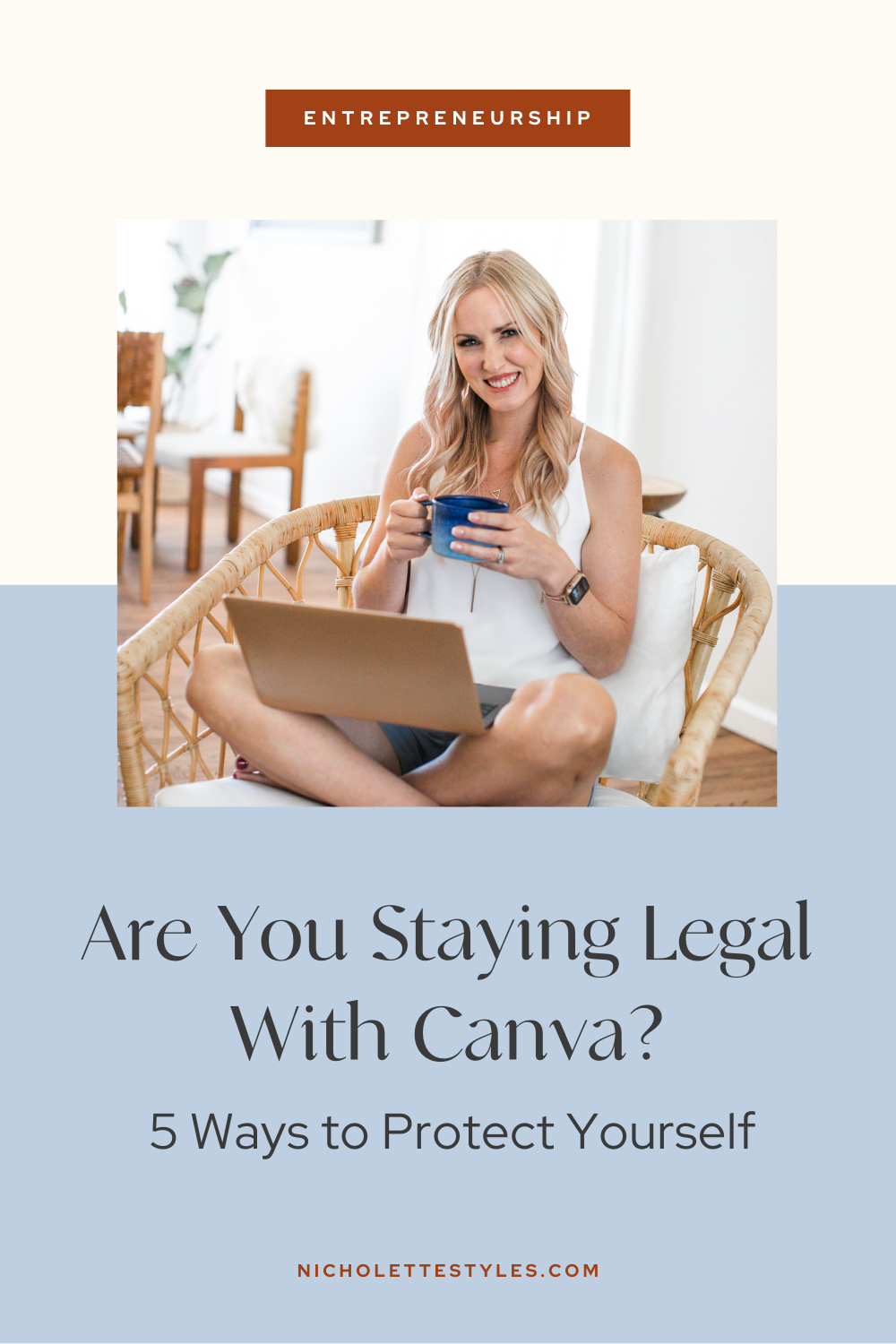Are You Staying Legal with Canva? 5 Ways to Protect Yourself

I love how Tamsen reminds me “Every business decision has a legal impact”.
I’ll be honest. For a long time, I saw the legal side of my business, as something I would get to when I had time. As an admin task that would always remain on my running to-do list.

But then I read somewhere and noticed for myself that not only is it super important and your job as a business owner to be safe and to do your research, but it also helps you to be seen to be more professional by your ideal clients.
All the Biz Babes that I loved online had their legal shit sorted.
I loved that about them. It made me feel like they were legit. They took the time to get it figured out.
Part of me felt (or was concerned), that being legal in my business, was going to cost me more money (even though I knew it might end up saving me tons more).
ENTER: Tamsen Horton.
Tamsen is my go-to legal expert, mom of two boys, and the best legal teacher I could have asked for.
She just has a way to breaking things down into simple steps that don't feel overwhelming or intimidating.
And because I’ve been getting a lot of questions about how to be safe with your Canva designs, I thought I’d do a little interview with Tamsen and answer some of your most pressing questions.
Watch the video below and the Interview questions below.
Breakdown of Interview Questions?
Q: WHAT IS THE FIRST THING WE NEED TO KNOW ABOUT BEING SAFE WITH OUR CANVA DESIGNS?
You need to know that every single business decision has a legal impact. It doesn’t matter what you are doing, there is a legal component to it.
Canva wants you to design, they want your stuff to look really good, but they also have guidelines that you need to stick to. Watch the video for a more detailed response.
Q: CAN I CREATE MY LOGO IN CANVA? (03:09)
Yes and no. Your logo is used to identify your brand, which triggers trademark law. The purpose of trademark identity is to distinguish your brand from other people. If you register the trademark, you’re saying “No one can own this look,” like the Nike Swoosh.
We use the term logo “loosely” to identify our business, course or product. But most of the time it’s not a logo. A logo is poured into concrete. Meaning, you’re not going to tweak it (like we often do) or rebrand it in a year or two.
Therefore, we’re not legally registering that logo and design with the US patent and trademark office. It’s a logo in that I'm using it from a design standpoint, but, it's not a logo because legally, I'm not enforcing my rights in the design against someone else. The reason you can’t legally trademark what you create in Canva is because you don’t own it.
The minute you change it, you didn’t have a logo to begin with.
If you’re going to change the font look and design elements, you can create your “logo” in Canva. If you’re creating a swoosh, a logo that will never change and is poured into concrete, don’t make it in Canva!
IN SHORT: If it’s poured into concrete, like a swoosh, don’t make it in Canva. Anything else really isn't a logo.
Q: WHAT SHOULD WE KNOW ABOUT FONTS? 12:21
Paid fonts (hello Creative Market), Google fonts, or Canva fonts, have similar requirements in that you have to read the terms of use for every font you purchase.
When you’re buying something, you usually have “use rights’, but not ownership rights. You, therefore, can’t legally protect it. Learn more about big-name brands (like Coke) at the 14:00-minute mark.
Q: CAN I CREATE AN EBOOK IN CANVA AND SELL IT TO MY AUDIENCE 15:28
Yes. Just make sure that wherever you got your ingredients from (the images, fonts, patterns, graphics) you know the rules, and that you are following them and allowed to legally use them in a design that you’re planning to sell.
Canva's rules are:
Stay under 2000 copies: One-time use is fine. Includes Print and digital.
Over 2k copies: Upgrade to multi-use license.
Over 250k copies: You need the extended-license.
Q: I USE MY #CLEVERWITHCANVA AND #NICHOLETTESTYLES HASHTAGS. ARE THERE ANY LEGAL THINGS I NEED TO BE AWARE OF? 21:50
Usually, there are two parts of a hashtag - the functional part to find it # and the part that comes after that “thename/words”.
For example: #CleverwithCanva
In most cases, you just need to be aware that you can’t prevent anyone else from using your hashtag, in your case you need to reach out to Canva to hear if using their name to create a course or promote your business is okay.
Learn more in the video ;)
TAMSEN’S TIPS:
Terms and Conditions (T+C's) - Read them!
I don't like reading them, so to simplify, I only stick to two resources. I get my images from Adobe and I do my design with Canva (18:28).
Make it easy for yourself, should there ever be legal consequences and keep a good track record of your Design Resources.
I know there are tons of other places to go to find great fonts, pretty images, and more. But I’m a lawyer, I don't like reading T+C's. I know the T+C’s for Adobe and Canva and that keeps it simple for me. You have to be willing to sit down and read the terms if you want to use or buy anything. Find 2-3 places you love and stick with them.
Learn more about Tamsen’s services here and @TamsenHorton everywhere on Social Media.
NICHOLETTE'S FAVE LEGAL RESOURCES
Tamsen ;) and BizleBox
Small Business Bodyguard
Annette Stepanian
Christina Scalera



